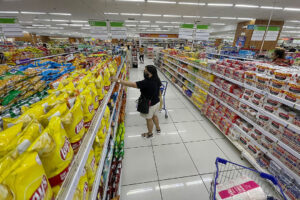A TAX on “junk food” as well as a tax increase on sweetened beverages could yield up to P76 billion in revenue in the first year of implementation, Finance Secretary Benjamin E. Diokno said.
Mr. Diokno said in a Viber message that the departments of Finance and Health (DoH) are pushing for a junk food and sweetened beverage tax to address “diabetes, obesity, and non-communicable diseases related to poor diet.”
“The implementation of the junk food and sweetened beverage tax package is projected to generate an additional P76 billion during the first year. The tax package is estimated to result in a 21% reduction in consumption of junk food,” he said.
Under the proposal, the government is seeking to impose a P10 tax per 100 grams or a P10 tax per 100 milliliters on “pre-packaged foods lacking nutritional value.” These include confectioneries, snacks, and desserts exceeding the DoH’s thresholds for fat, salt, and sugar content.
It is also aiming to raise the sweetened beverage tax to P12 per liter for any kind of sweetener used.
“This tax rate will be indexed annually by 4%, and exemptions will be eliminated to broaden the tax base. These measures aim to strengthen the effectiveness of the sweetened beverage tax by further discouraging the consumption of such beverages,” Mr. Diokno added.
Under the Tax Reform for Acceleration and Inclusion law, the government introduced an excise tax of P6 per liter for drinks containing caloric or non-caloric sweetener, and P12 per liter for drinks containing high-fructose corn syrup or such sweeteners in combination.
Revenue raised from the tax measure will fund projects such as the government’s food stamp program, Mr. Diokno added.
Separately, Budget Secretary Amenah F. Pangandaman during the Kapihan sa Manila Bay forum on Wednesday said that the tax measure will likely be tackled when Congress resumes session.
“Their revenue measures for sweet and salty food and beverages were planned to kick in by 2025, but what they did is, they will advance it to 2024. When the Congress opens, now until the end of the year, they will push for the new revenue measures,” she said.
“I think it makes sense, you increase your revenue and at the same time help the population be healthier. When the incidence of these diseases is high, then the requirements of the National Government to care for the population will also rise,” she added. — Luisa Maria Jacinta C. Jocson

